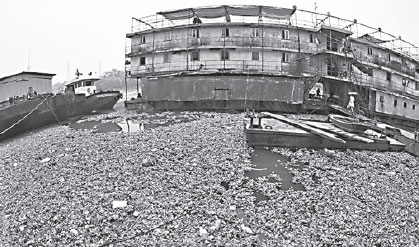
Water hyacinth occupies a large area of the Wuhan section of the Hanjiang River in Hubei province on Thursday. (Li Ziyun/for China Daily)
China's top legislature has been asked to make more efforts to combat water pollution nationwide following an investigation that found 15.5 percent of cities had drinking water sources below standard.
Out of 329 cities, the sources of public drinking water in 278 failed to reach the level required.
This is according to the results of a two-month investigation by a law enforcement group under the Standing Committee of the National People's Congress announced on Thursday.
The 32-member group has completed the investigation into enforcement of the Law on Water Pollution and Prevention. It also found that 24.6 percent of major lakes in China last year faced eutrophication problems, a reference to excessive nutrients.
Chen Changzhi, head of the group, said the investigation found that some highly polluting enterprises located upstream of some cities posed a greater risk to water safety.
Underground water sources in some cities are severely polluted, some cities lack comprehensive monitoring and analysis systems and others are unable to cope with polluted drinking water emergencies.
Just two months ago, the Ministry of Environmental Protection said in its 2014 report on environmental conditions that the quality of 96.2 percent of drinking water sources in all 329 cities met the standard.
The group also found that among all the major environmental pollution cases investigated by the ministry last year, more than 60 percent were related to water pollution.
In his report to the top legislature on Thursday, Chen suggested strengthening legislation to reinforce the fight against water pollution.
He also called for stricter controls on sewage discharge, more transparent public information on water pollution and a more reasonable ecological compensation system.
"The evaluation system for government work should include efforts to protect water, meaning the government role in environmental protection should be further clarified," Chen said.
A shortage of personnel to enforce the Law on Water Pollution and Prevention is another severe challenge confronting efforts to improve water quality, Chen said.
"In every 10,000 square kilometers, there are only 63 law enforcement workers for environmental pollution. The number of people is not sufficient to tackle all pollution problems," he added.


















































